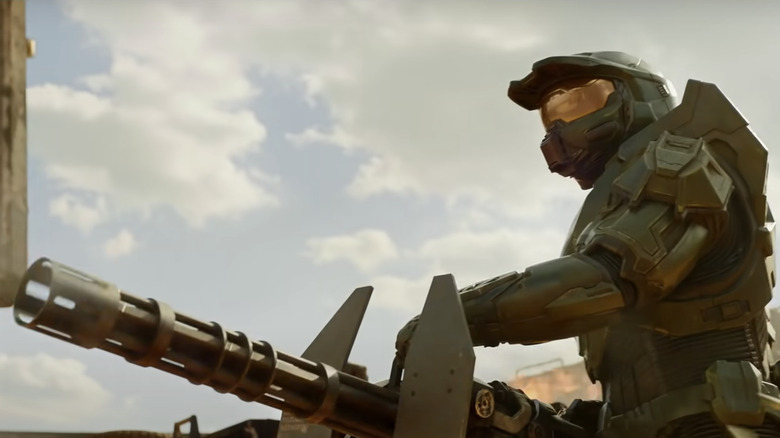Halo Showrunner Explains Why 'We Didn't Look At The Game' When Creating The TV Series
Adapting a video game or any intellectual property, especially one with a large built-in fanbase, for film or television carries with it a degree of expectation; but there's also the nuts-and-bolts requirements of storytelling, which works differently across different mediums. Sometimes adaptations that stray a bit from the source material but remain true to the spirit of it can be better than ones that rigidly adhere to it. For the new "Halo" streaming TV series on Paramount+, showrunners Steven Kane and Kyle Killen have made a conscious decision, it seems, to avoid consulting the bestselling Xbox game as they went about bringing it to television.
"Halo" went through development hell for many years and is only just now coming out the other side, with its nine-episode first season set to premiere this week. Speaking to Variety, Kane estimated that he had written "upwards of 265 drafts" of scripts for the first season, with the story serving various masters (along with protagonist Master Chief, played by Pablo Schreiber) such as practical production needs, the existing "Halo" mythology, and studio notes from production company 343 Industries and executive producer Steven Spielberg.
"Halo" was previously in development as a movie, but apparently, one of the problems that kept it from getting off the ground was that Microsoft, the parent company of Xbox, was too wedded to the game's backstory. Owing to this, 343 and Spielberg's production company, Amblin, decided to go the Marvel Studios route and instead "draw heavily from the mythology" but chart their "own separate storytelling path" with "Halo." Kane explained:
"We didn't look at the game. We didn't talk about the game. We talked about the characters and the world. So I never felt limited by it being a game."
'Trying to verbatim stay with everything that'd come before wasn't serving the medium'
Kiki Wolfkill, who is co-executive producing "Halo" alongside Spielberg and many others, added:
"Early on, we were thinking about doing something that could tie very closely with the game. What we were finding was, trying to verbatim stay with everything that'd come before wasn't serving the medium. It also wasn't serving the creative teams and their need to express a story and build the world through their eyes."
On the one hand, Kane's comments about not looking at the game or talking about the game are almost reminiscent of old stories of Bryan Singer banning comic books from the set of "X-Men," so that associate producer (and future Marvel Studios boss) Kevin Feige had to slip actors comics when Singer wasn't looking. On the other hand, it sounds like the producers of the "Halo" series just reached a point where they were too tethered to the game and needed to free themselves creatively.
"Halo" is one of the few video games that I played regularly back in college, but my buddies and I would mostly just play Capture the Flag in Blood Gulch or put it in Slayer mode in Hang 'Em High and go after each other that way so that it was every man for himself. I'm not as familiar with the game's actual narrative beyond that, but gamers-turned-viewers will be able to see the "Halo" TV series and judge for themselves how well-adapted it is when it premieres on Paramount+ on March 24, 2022.
